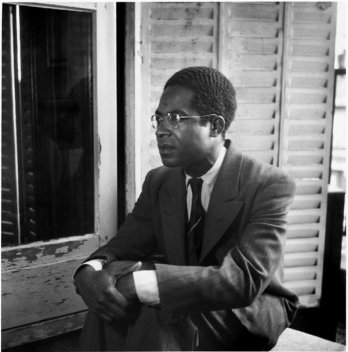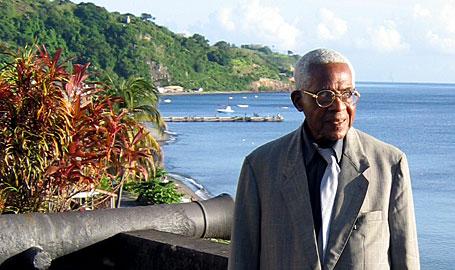<Back to Index>
- Writer and Politician Aimé David Fernand Césaire, 1913
PAGE SPONSOR
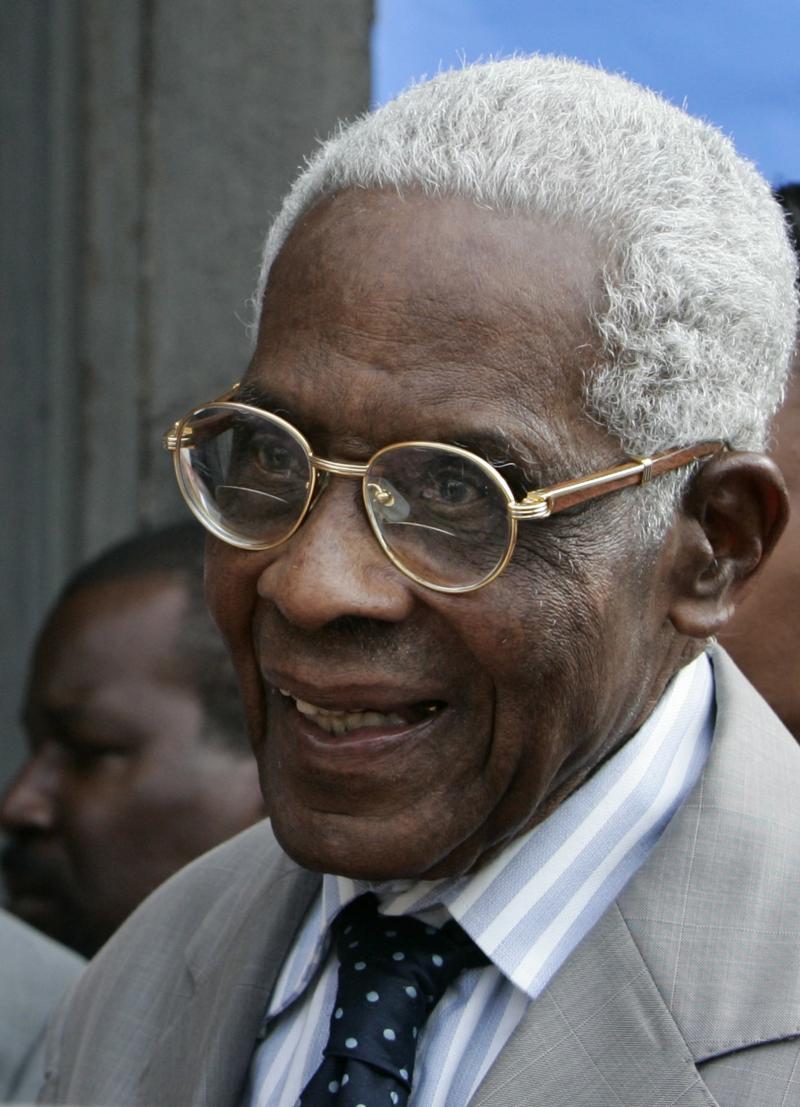
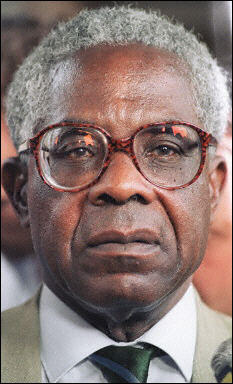
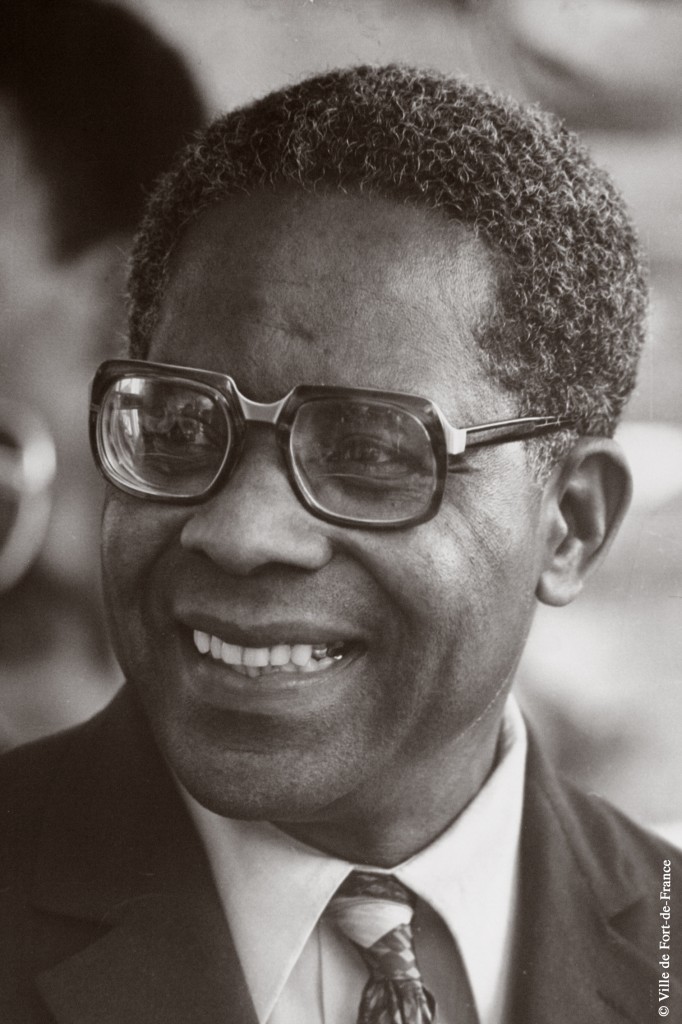
Aimé Fernand David Césaire (26 June 1913 – 17 April 2008) was a French poet, author and politician from Martinique. He was "one of the founders of the négritude movement in Francophone literature".
Aimé Césaire was born in Basse - Pointe, Martinique, in 1913. He traveled to Paris to attend the Lycée Louis - le - Grand on an educational scholarship. In Paris, Césaire, who in 1935 passed an entrance exam for the École normale supérieure, created, with Léopold Sédar Senghor and Léon Damas, the literary review L'Étudiant Noir (The Black Student). In 1936, Césaire began work on his long poem "Cahier d'un retour au pays natal", a vivid and powerful depiction of the ambiguities of Caribbean life and culture in the New World and this upon returning home to Martinique.
Césaire married fellow Martinican student Suzanne Roussi in 1937. Together they moved back to Martinique in 1939 with their young son. Césaire became a teacher at the Lycée Schoelcher in Fort - de - France, where he taught Frantz Fanon and served as an inspiration for, but did not teach, Édouard Glissant. He would become a heavy influence for Fanon as both a mentor and a contemporary throughout Fanon's short life.
The years of World War II were ones of great intellectual activity for the Césaires. In 1941, Aimé Césaire and Suzanne Roussi founded the literary review Tropiques, with the help of other Martinican intellectuals such as René Ménil and Aristide Maugée, in order to challenge the cultural status quo and alienation that then characterized Martinican identity. Many run - ins with censorship did not deter Césaire from being an outspoken defendant of Martinican identity. He also became close to French surrealist poet André Breton, who spent time in Martinique during the war. (The two had met in 1940, and Breton would champion Cesaire's work.)
In 1947 he was finally able to publish his book length poem Cahier d'un retour au pays natal (Notebook of a Return to the Native Land), which had first been published in the Parisian periodical Volontés in 1939. The book mixes poetry and prose to express his thoughts on the cultural identity of black Africans in a colonial setting. Breton contributed a laudatory introduction to this 1947 edition, saying that the "poem is nothing less than the greatest lyrical monument of our times."
In 1945, with the support of the French Communist Party (PCF), Césaire was elected mayor of Fort - de - France and deputy to the French National Assembly for Martinique. He was one of the principal drafters of the 1946 law on departmentalizing former colonies, a role for which independentist politicians have often criticized him.
Like many left intellectuals in France, Césaire looked in the 1930s and 1940s toward the Soviet Union as a source of human progress, virtue, and human rights, but Césaire later grew disillusioned with Communism. In 1956, after the Soviet Union's suppression of the Hungarian revolution, Aimé Césaire announced his resignation from the PCF in a text entitled Lettre à Maurice Thorez. In 1958 he founded the Parti Progressiste Martiniquais.
His writings during this period reflect his passion for civic and social engagement. He wrote Discours sur le colonialisme (Discourse on Colonialism) (1950; English translation 1953), a denunciation of European colonial racism, decadence and hypocrisy that was republished in the French review Présence Africaine in 1955. In 1960, he published Toussaint Louverture, based on the life of the Haitian revolutionary. In 1968, he published the first version of Une Tempête, a radical adaptation of Shakespeare's play The Tempest for a black audience.
He served as President of the Regional Council of Martinique from 1983 to 1988. He retired from politics in 2001.
In 2006, he refused to meet the leader of the Union for a Popular Movement (UMP), Nicolas Sarkozy, then a probable contender for the 2007 presidential election, because the UMP had voted for the February 23, 2005 law asking teachers and textbooks to "acknowledge and recognize in particular the positive role of the French presence abroad, especially in North Africa", a law considered by many as a eulogy to colonialism and French actions during the Algerian War. President Jacques Chirac finally had the controversial law repealed.
On 9 April 2008, Cesaire had serious heart troubles and was admitted to Pierre Zobda Quitman hospital in Fort - de - France. He died on 17 April 2008.
Césaire was accorded the honor of a state funeral, held at the Stade de Dillon in Fort - de - France on April 20. President Nicolas Sarkozy was present but did not make a speech. Pierre Aliker, who served for many years as deputy mayor under Césaire, gave the funeral oration.
Martinique's airport at Le Lamentin was renamed Martinique Aimé Césaire International Airport on 15 January 2007. A national commemoration ceremony was held on April 6, 2011, as a plaque in Aimé Césaire's name was inaugurated in the Panthéon in Paris.
